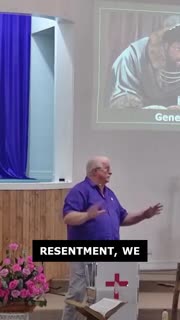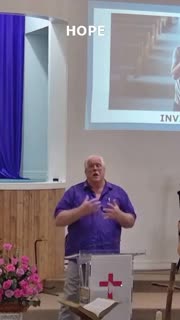Jacob: A Journey of Deception, Grace, and Redemption
Devotional
Sermon Summary
Bible Study Guide
Sermon Clips
1. "Fear not, for I have redeemed you. I have called you. I have called you by your name. You are mine. For those of us that are believers, that is a precious scripture right there. He's called us by name, and we are his. It's not based on how we feel. It's not based on what we've done. It's based on him. Now, we do have to ask him in, so that is part of what we do." [01:53] (21 seconds)
2. "Jacob is a colorful character in many ways, but when you think, some of you, I know this applies to some of you, may not, but when you think of family dysfunction, when you think of, you know, future generations causing problems for later generations, there's three of them right there. Some of the things that they did caused problems for their kids, their grandkids, on, down, through." [02:37] (25 seconds)
3. "Jacob is a liar, he's a thief, he's a cheat. His story continues on. Jacob dies in Genesis in chapter 49. I mentioned that earlier. So there's so much we could go over. We could keep going on until Christmas just about Jacob. But we're not going to do that." [13:00] (19 seconds)
4. "If we have a legitimate resentment, we can get in big trouble because it's still a resentment. And so we're still mad at somebody about something. And it can twist our spiritual condition in a bad way. So Esau's saying how he feels. I'm going to kill that sucker. He's messed me around one too many times. I'm fixing to end him." [14:06] (20 seconds)
5. "Well, why would he save you? Why would he save me? Because it's him because he's the good God. We're not the good kids. We're not the good people. He's the good God." [16:47] (16 seconds)
6. "Despite Jacob and Rebecca's deception, God's favorable blessings on Jacob was part of his sovereign plan. Through Jacob would come the 12 tribes of Israel. God also reaffirmed his choice of Jacob later in his life following Jacob's decision. Jacob's encounter with God at Bethel, and that's Genesis 28, 10 through 22. Here God reiterates the covenant promises spoken over Jacob, showing this was not merely the result of human scheming, but divine ordination." [26:16] (35 seconds)
7. "Though Jacob was a grasper and a deceiver, God transformed him into a man of faith. This account displays God's astounding grace in accomplishing his purpose through weak and sinful people. The ultimate purpose in choosing Jacob was that the Messiah would come through his descendants. As Paul wrote, Christ, who is God, God over all, forever blessed, amen, came according to the flesh from the Israelites." [27:00] (34 seconds)
8. "And if God can save and redeem Jacob and make him Israel, do you think he can do it with you? I just love this story because it gives me hope. I haven't done many of the things that Jacob did, but I've done a lot. A lot of different ones that aren't necessarily revealed on Jacob's list. But I've made so many mistakes and not valued my wife and not given my kids the time that they really deserved and not encouraged them." [30:42] (40 seconds)
9. "I hope you recognize that God uses broken sins to heal sinners. I'm one, that's for sure. He's made me better, still broken. If you're struggling with some broken, just know God loves you too. And God wants to redeem you. Maybe he already has. If you need to rededicate your life, that's easy. If you want to ask Jesus to come into your heart and secure your salvation for eternity, that's easy. He paid the price. You just have to be honest with him and talk to him." [35:20] (29 seconds)
10. "You ever struggle with God? Do you ever struggle with God? Do you ever struggle with humans? I struggle with traffic, and it don't even have a heartbeat. I struggle with lots of stuff. But he ended up listening. He ended up surrendering. He ended up facing the places where he was off. And God was able to use him in such a way that Jesus is in his land. Do you think Jacob fits as one of the redeemed?" [32:34] (37 seconds)
Ask a question about this sermon
2. "Jacob is a colorful character in many ways, but when you think, some of you, I know this applies to some of you, may not, but when you think of family dysfunction, when you think of, you know, future generations causing problems for later generations, there's three of them right there. Some of the things that they did caused problems for their kids, their grandkids, on, down, through." [02:37] (25 seconds)
3. "Jacob is a liar, he's a thief, he's a cheat. His story continues on. Jacob dies in Genesis in chapter 49. I mentioned that earlier. So there's so much we could go over. We could keep going on until Christmas just about Jacob. But we're not going to do that." [13:00] (19 seconds)
4. "If we have a legitimate resentment, we can get in big trouble because it's still a resentment. And so we're still mad at somebody about something. And it can twist our spiritual condition in a bad way. So Esau's saying how he feels. I'm going to kill that sucker. He's messed me around one too many times. I'm fixing to end him." [14:06] (20 seconds)
5. "Well, why would he save you? Why would he save me? Because it's him because he's the good God. We're not the good kids. We're not the good people. He's the good God." [16:47] (16 seconds)
6. "Despite Jacob and Rebecca's deception, God's favorable blessings on Jacob was part of his sovereign plan. Through Jacob would come the 12 tribes of Israel. God also reaffirmed his choice of Jacob later in his life following Jacob's decision. Jacob's encounter with God at Bethel, and that's Genesis 28, 10 through 22. Here God reiterates the covenant promises spoken over Jacob, showing this was not merely the result of human scheming, but divine ordination." [26:16] (35 seconds)
7. "Though Jacob was a grasper and a deceiver, God transformed him into a man of faith. This account displays God's astounding grace in accomplishing his purpose through weak and sinful people. The ultimate purpose in choosing Jacob was that the Messiah would come through his descendants. As Paul wrote, Christ, who is God, God over all, forever blessed, amen, came according to the flesh from the Israelites." [27:00] (34 seconds)
8. "And if God can save and redeem Jacob and make him Israel, do you think he can do it with you? I just love this story because it gives me hope. I haven't done many of the things that Jacob did, but I've done a lot. A lot of different ones that aren't necessarily revealed on Jacob's list. But I've made so many mistakes and not valued my wife and not given my kids the time that they really deserved and not encouraged them." [30:42] (40 seconds)
9. "I hope you recognize that God uses broken sins to heal sinners. I'm one, that's for sure. He's made me better, still broken. If you're struggling with some broken, just know God loves you too. And God wants to redeem you. Maybe he already has. If you need to rededicate your life, that's easy. If you want to ask Jesus to come into your heart and secure your salvation for eternity, that's easy. He paid the price. You just have to be honest with him and talk to him." [35:20] (29 seconds)
10. "You ever struggle with God? Do you ever struggle with God? Do you ever struggle with humans? I struggle with traffic, and it don't even have a heartbeat. I struggle with lots of stuff. But he ended up listening. He ended up surrendering. He ended up facing the places where he was off. And God was able to use him in such a way that Jesus is in his land. Do you think Jacob fits as one of the redeemed?" [32:34] (37 seconds)










